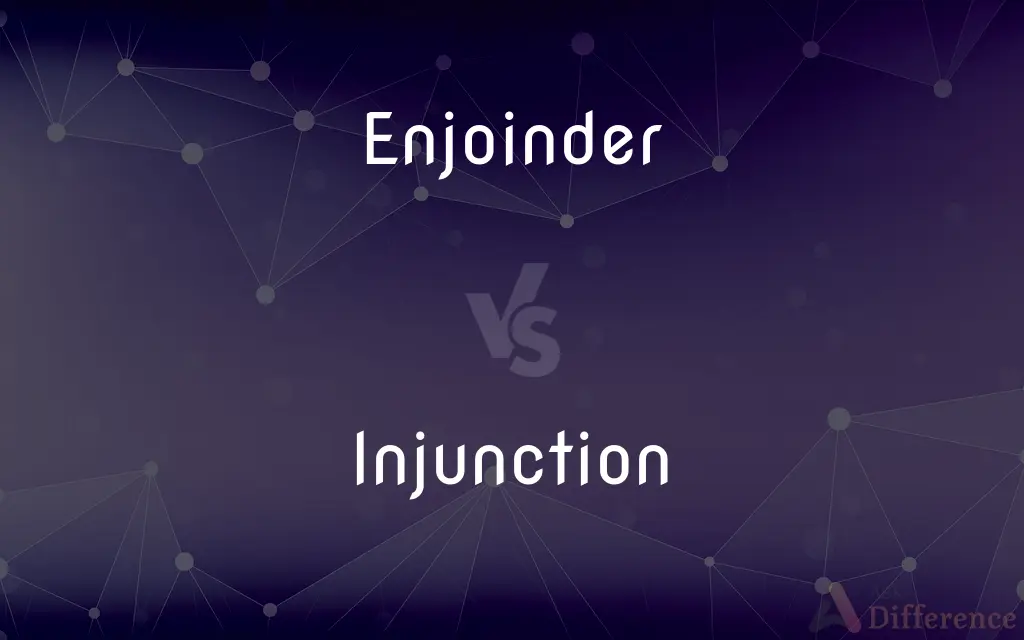Enjoinder vs. Injunction — What's the Difference?
By Tayyaba Rehman & Urooj Arif — Updated on May 5, 2024
Enjoinders are general commands or directives in law, while injunctions are specific court orders that mandate or prohibit certain actions.

Difference Between Enjoinder and Injunction
Table of Contents
ADVERTISEMENT
Key Differences
An enjoinder in legal terms refers to a command or an authoritative warning, often used broadly in discussions of law. On the other hand, an injunction is a specific legal remedy issued by a court that requires a party to do, or to refrain from doing, certain acts.
Enjoinders can be issued in various legal contexts as part of statutes or legal opinions, serving to guide behavior within a broad scope. In contrast, injunctions are direct and are typically used in civil law to address situations where immediate and irreparable harm is threatened.
The authority behind an enjoinder is generally derived from legal principles or statutory frameworks, aiming to influence or control legal conduct broadly. Whereas, an injunction is backed by the judicial power of the court, making it enforceable through penalties like fines or imprisonment for non-compliance.
Enjoinders do not typically require supervision by the court for compliance, given their general nature. However, injunctions are closely monitored, and compliance is often overseen directly by the issuing court.
While enjoinders may have a preventive or directive role without immediate legal consequences for disobedience, injunctions carry significant legal weight, and failing to comply can result in immediate legal repercussions, including contempt of court.
ADVERTISEMENT
Comparison Chart
Definition
A general command or directive in law.
A specific court order to do or not do something.
Legal Authority
Derived from statutory or legal frameworks.
Issued directly by a court with judicial authority.
Enforcement
Generally no direct legal penalties for non-compliance.
Non-compliance can lead to penalties like fines or imprisonment.
Supervision
No direct court supervision required.
Court supervision often required to ensure compliance.
Usage Context
Broad legal discussions or guidance.
Specific legal disputes needing immediate action.
Compare with Definitions
Enjoinder
A general admonition or injunction in law.
Enjoinders in environmental law dictate certain preventative measures.
Injunction
A court order requiring a party to do or cease doing specific actions.
The court issued an injunction to stop the construction.
Enjoinder
A command or authoritative advice within legal context.
The legal textbook included a chapter on the importance of adhering to legal enjoinders.
Injunction
A judicial remedy to prevent irreparable harm.
An injunction was necessary to prevent the demolition of the historic site.
Enjoinder
A directive issued within legal frameworks or discussions.
The attorney referenced several important enjoinders during her argument.
Injunction
A legal enforcement tool for protecting rights.
The injunction protected the inventor’s patents against infringement.
Enjoinder
An official urge or warning in legal terms.
The new regulations came with an enjoinder against non-compliance.
Injunction
A prohibitory or mandatory court order.
The mandatory injunction required the factory to install pollution control equipment.
Enjoinder
A broader legal principle commanding specific conduct.
The legislative enjoinder was clear about the new compliance requirements.
Injunction
A specific command issued by a court during disputes.
The judge granted an injunction that required all parties to maintain the status quo.
Enjoinder
An authoritative request or injunction
An enjoinder not to swim when the lifeguard was off duty.
Injunction
An injunction is a legal and equitable remedy in the form of a special court order that compels a party to do or refrain from specific acts. "When a court employs the extraordinary remedy of injunction, it directs the conduct of a party, and does so with the backing of its full coercive powers." A party that fails to comply with an injunction faces criminal or civil penalties, including possible monetary sanctions and even imprisonment.
Enjoinder
A request or demand from an authority.
Injunction
The act or an instance of enjoining; a command, directive, or order.
Injunction
(Law) A court order requiring a party to refrain from doing a particular act or to do a particular act.
Injunction
The act of enjoining; the act of directing, commanding, or prohibiting.
Injunction
That which is enjoined; such as an order, mandate, decree, command, precept.
Injunction
(legal) A writ or process, granted by a court of equity, and, in some cases, under statutes, by a court of law, whereby a party is required to do or to refrain from doing certain acts, according to the exigency of the writ.
Injunction
The act of enjoining; the act of directing, commanding, or prohibiting.
Injunction
That which is enjoined; an order; a mandate; a decree; a command; a precept; a direction.
For still they knew, and ought to have still remembered,The high injunction, not to taste that fruit.
Necessary as the injunctions of lawful authority.
Injunction
A writ or process, granted by a court of equity, and, in some cases, under statutes, by a court of law, whereby a party is required to do or to refrain from doing certain acts, according to the exigency of the writ.
Injunction
A formal command or admonition
Injunction
(law) a judicial remedy issued in order to prohibit a party from doing or continuing to do a certain activity;
Injunction were formerly obtained by writ but now by a judicial order
Common Curiosities
How does an injunction differ from an enjoinder in terms of enforcement?
Unlike enjoinders, injunctions carry direct penalties for non-compliance, including potential fines or imprisonment.
Can an enjoinder lead to an injunction?
Yes, if the principles or directives in an enjoinder are ignored, it may lead to legal proceedings that result in an injunction.
What are common situations where injunctions are used?
Injunctions are often used in cases of potential irreparable harm, such as environmental damage, copyright infringement, or to halt ongoing legal violations.
What are the consequences of violating an injunction?
Violating an injunction can lead to severe penalties, including fines, imprisonment, or both.
What legal remedies are similar to an injunction?
Other legal remedies similar to injunctions include restraining orders and specific performance orders.
What is an injunction?
An injunction is a specific court order that commands a party to perform or refrain from performing certain acts, legally enforceable with penalties.
How quickly can a court issue an injunction?
Courts can issue temporary injunctions very quickly, often within days or even hours in urgent cases.
Is an injunction always a temporary measure?
No, injunctions can be temporary (preliminary) or permanent, depending on the duration of the relief needed.
What is a preliminary injunction?
A preliminary injunction is a temporary order issued to maintain the status quo until a full hearing can be held.
What is an enjoinder?
An enjoinder is a general command or directive within a legal framework, often broader and less enforceable directly by courts.
Are enjoinders common in all types of law?
Enjoinders are common in many areas of law but are particularly noted in regulatory, environmental, and administrative law.
Can injunctions be appealed?
Yes, injunctions can be appealed, and the appeal process may suspend the enforcement of the injunction until the appeal is resolved.
Who can issue an enjoinder?
Enjoinders can be issued by legal authorities or through statutory mechanisms, not necessarily through a court.
How specific are the directives in an enjoinder?
Directives in enjoinders are generally less specific compared to injunctions and are more about guiding legal conduct.
How do courts decide to grant an injunction?
Courts consider factors like the likelihood of irreparable harm, the balance of hardships, the public interest, and the plaintiff’s likelihood of success on the merits.
Share Your Discovery

Previous Comparison
Midday vs. Midnight
Next Comparison
When vs. IfAuthor Spotlight
Written by
Tayyaba RehmanTayyaba Rehman is a distinguished writer, currently serving as a primary contributor to askdifference.com. As a researcher in semantics and etymology, Tayyaba's passion for the complexity of languages and their distinctions has found a perfect home on the platform. Tayyaba delves into the intricacies of language, distinguishing between commonly confused words and phrases, thereby providing clarity for readers worldwide.
Co-written by
Urooj ArifUrooj is a skilled content writer at Ask Difference, known for her exceptional ability to simplify complex topics into engaging and informative content. With a passion for research and a flair for clear, concise writing, she consistently delivers articles that resonate with our diverse audience.
















































